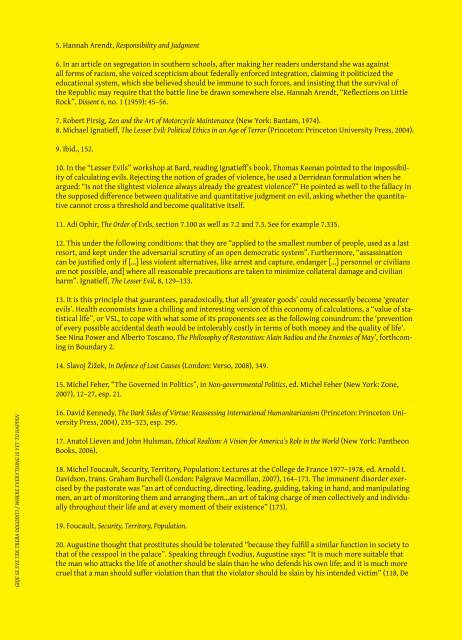Nicoline van Harskamp - DeLVe | Institute for Duration, Location and ...
Nicoline van Harskamp - DeLVe | Institute for Duration, Location and ...
Nicoline van Harskamp - DeLVe | Institute for Duration, Location and ...
Create successful ePaper yourself
Turn your PDF publications into a flip-book with our unique Google optimized e-Paper software.
GDJE SE SVE TEK TREBA DOGODITI / WHERE EVERYTHING IS YET TO HAPPEN<br />
5. Hannah Arendt, Responsibility <strong>and</strong> Judgment<br />
6. In an article on segregation in southern schools, after making her readers underst<strong>and</strong> she was against<br />
all <strong>for</strong>ms of racism, she voiced scepticism about federally en<strong>for</strong>ced integration, claiming it politicized the<br />
educational system, which she believed should be immune to such <strong>for</strong>ces, <strong>and</strong> insisting that the survival of<br />
the Republic may require that the battle line be drawn somewhere else. Hannah Arendt, “Reflections on Little<br />
Rock”, Dissent 6, no. 1 (1959): 45–56.<br />
7. Robert Pirsig, Zen <strong>and</strong> the Art of Motorcycle Maintenance (New York: Bantam, 1974).<br />
8. Michael Ignatieff, The Lesser Evil: Political Ethics in an Age of Terror (Princeton: Princeton University Press, 2004).<br />
9. Ibid., 152.<br />
10. In the “Lesser Evils” workshop at Bard, reading Ignatieff’s book, Thomas Keenan pointed to the impossibility<br />
of calculating evils. Rejecting the notion of grades of violence, he used a Derridean <strong>for</strong>mulation when he<br />
argued: “Is not the slightest violence always already the greatest violence?” He pointed as well to the fallacy in<br />
the supposed difference between qualitative <strong>and</strong> quantitative judgment on evil, asking whether the quantitative<br />
cannot cross a threshold <strong>and</strong> become qualitative itself.<br />
11. Adi Ophir, The Order of Evils, section 7.100 as well as 7.2 <strong>and</strong> 7.3. See <strong>for</strong> example 7.335.<br />
12. This under the following conditions: that they are “applied to the smallest number of people, used as a last<br />
resort, <strong>and</strong> kept under the adversarial scrutiny of an open democratic system”. Furthermore, “assassination<br />
can be justified only if […] less violent alternatives, like arrest <strong>and</strong> capture, endanger […] personnel or civilians<br />
are not possible, <strong>and</strong>] where all reasonable precautions are taken to minimize collateral damage <strong>and</strong> civilian<br />
harm”. Ignatieff, The Lesser Evil, 8, 129–133.<br />
13. It is this principle that guarantees, paradoxically, that all ‘greater goods’ could necessarily become ‘greater<br />
evils’. Health economists have a chilling <strong>and</strong> interesting version of this economy of calculations, a “value of statistical<br />
life”, or VSL, to cope with what some of its proponents see as the following conundrum: the ‘prevention<br />
of every possible accidental death would be intolerably costly in terms of both money <strong>and</strong> the quality of life’.<br />
See Nina Power <strong>and</strong> Alberto Toscano, The Philosophy of Restoration: Alain Badiou <strong>and</strong> the Enemies of May’, <strong>for</strong>thcoming<br />
in Boundary 2.<br />
14. Slavoj Žižek, In Defence of Lost Causes (London: Verso, 2008), 349.<br />
15. Michel Feher, “The Governed in Politics”, in Non-governmental Politics, ed. Michel Feher (New York: Zone,<br />
2007), 12–27, esp. 21.<br />
16. David Kennedy, The Dark Sides of Virtue: Reassessing International Humanitarianism (Princeton: Princeton University<br />
Press, 2004), 235–323, esp. 295.<br />
17. Anatol Lieven <strong>and</strong> John Hulsman, Ethical Realism: A Vision <strong>for</strong> America’s Role in the World (New York: Pantheon<br />
Books, 2006).<br />
18. Michel Foucault, Security, Territory, Population: Lectures at the College de France 1977–1978, ed. Arnold I.<br />
Davidson, trans. Graham Burchell (London: Palgrave Macmillan, 2007), 164–173. The immanent disorder exercised<br />
by the pastorate was “an art of conducting, directing, leading, guiding, taking in h<strong>and</strong>, <strong>and</strong> manipulating<br />
men, an art of monitoring them <strong>and</strong> arranging them…an art of taking charge of men collectively <strong>and</strong> individually<br />
throughout their life <strong>and</strong> at every moment of their existence” (173).<br />
19. Foucault, Security, Territory, Population.<br />
20. Augustine thought that prostitutes should be tolerated “because they fulfill a similar function in society to<br />
that of the cesspool in the palace”. Speaking through Evodius, Augustine says: “It is much more suitable that<br />
the man who attacks the life of another should be slain than he who defends his own life; <strong>and</strong> it is much more<br />
cruel that a man should suffer violation than that the violator should be slain by his intended victim” (118, De


